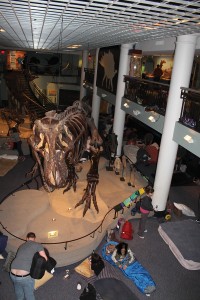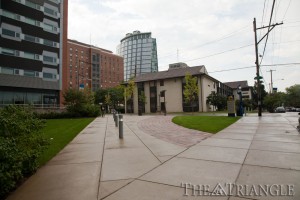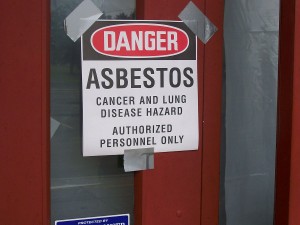The Academy of Natural Sciences’ hosted its very first “Overnight for Adults” event March 7-8. Propping open the Academy doors at 6:30 p.m., 96 attendees, their ages ranging from mid-20s to 40s, flooded in to live their dream of spending a night at the museum.
“We do sleepover parties for families all the time. It’s a great program. Families have a wonderful time. But we just decided to expand it to our adult audience. We decided that the adults deserve to sleepover too,” Christine Danowsky, an Academy employee who worked the event said.
“Without their kids!” Hollie Barattolo, another Academy employee added. “Or [it’s] for people who don’t have kids to get to do fun things.”
At a price of $165 for members and $190 for nonmembers, those in attendance were given the chance to take behind-the-scenes tours in the museum’s mammalogy, ichthyology and entomology departments given by the Academy’s curators. These tours allowed guests the chance to see artifacts and collections in custody of the museum but not currently on display, such as cases of preserved bugs that have been given to the museum by wealthy donors, as well as jars of preserved fish and mammal specimens.
One attendee, Otis Wells, opted for the mammalogy tour and found it to be his favorite part of the night by far. “I liked the animals in the jars, like the monkey and the two-headed cat. That was for me the best part of the trip. I got to pick up a bat and I got to hold a walrus penis in my hand,” Wells said.
Also included in the night’s perks were a build-your-own-fajita station in the Academy’s cafeteria, an endless supply of coffee and tea, and a Science Live Bar supplied by 12th Street Catering.
In between eating and going on tours, adults wandered throughout the museum in pairs completing various activities. Guests enjoyed listening to employees tell ghost stories about how each taxidermy animal came to be at the museum, drawing on glass in front of a zebra and antelope display in the African wing and viewing live animals that had been posted around the museum. One of the more interesting attractions of the night was painting with hissing cockroaches. Here, employees allowed visitors to place various colors of nontoxic paint onto a piece of paper, over which the cockroaches would run, creating unique paintings.
At 11 p.m. the Academy held a live animal show in the auditorium to teach the crowd a little more about two animal residents — a porcupine and a turkey vulture.
The night wrapped up with a midnight movie, after which the adults scattered around the museum placing air mattresses and yoga mats beside exhibitions where they wished to hunker down for the night.
In the morning breakfast was served promptly at 7:30 a.m.; the visitors then packed up their things and returned to their daily lives.
The next “Overnight for Adults” event will be cryptozoology-themed, focusing on the study of legendary animals. Several attendees already indicated their excitement for the next sleepover throughout the night.
“Typically, people who come to our events know that we don’t traditionally repeat activates. So it’s not like if you come once and you come again you’re going to do the same things. We try to expand on what we did and if we do repeat something it’s because people said they really enjoyed it,” Danowsky said..
The date for the next “Overnight for Adults” has already been set for Oct. 3 and is in the process of being planned.
The post The Academy of Natural Sciences hosts night at the museum with “Overnight for Adults” appeared first on The Triangle.










